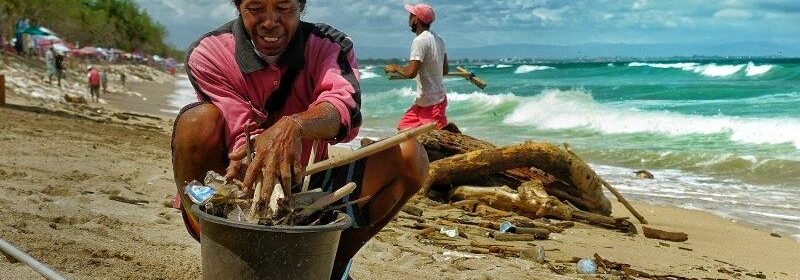The mission to clean up Bali’s beaches and end ‘trash season’

Bali: With a bucket in hand, Waywan Wetra collects rubbish and tree branches strewn across the sand near the stall where he sells drinks and snacks at Kuta Beach.
“When there is trash everywhere, tourists won’t stop and buy my drinks. Why would they?” the 57-year-old vendor says. “There is no space for them to sunbathe or walk, everywhere you see [it’s] all trash. Who would stay for that?
Wayan Wetra cleans the beach space in front of his stall at Kuta Beach.Credit:Amilia Rosa
“So at times like these, each stall owner, hundreds of us, from Kuta to Canggu, will clean the space in front of their stalls and pile it up on the side, ready to be picked up.”
Bali’s coastline is one of its greatest attractions here but lately, its popular western-facing beaches have been less alluring, with a mass of plastic debris and other rubbish spoiling the landscape.
It’s an annual occurrence in the tourism hub from September to March, particularly at the height of the monsoon season. Plastic bags, bottles and other residual waste dumped in rivers on the island and elsewhere in the Indonesian archipelago are blown by wind and currents into the ocean facing Bali, with tonnes of it ending up on the shore.
“In the past, I’ve been surfing at Canggu and that’s been polluted and dirty,” says Nicholas Magro, a 28-year-old visitor from Sydney. “You’re sitting around and you’re grabbing handfuls of plastic, it’s a bit uncomfortable and it takes away the beauty. It’s very unfortunate.”
Ella Solomon and Nicholas Magro and Sydney take in Kuta Beach.Credit:Amilia Rosa
Indonesia is the world’s second-largest plastic polluter, trailing only China, generating 1.29 million tonnes of waste that winds up in the sea every year, according to the United Nations.
The evidence of how far and wide it spreads is there to see on the beaches of Bali for several months a year.
“In 2021 when we were cleaning the Bali beaches during the trash season, we found hundreds of school hats from Java,” says Frenchman Gary Bencheghib, who co-founded the NGO Sungai Watch with his brother Sam and sister Kelly to help tackle the scourge of pollution.
In 2017, Indonesia outlined grand plans to drastically reduce its plastic waste, aiming to bring it down by 70 per cent by 2025 and to zero by 2040. Vastly improving rubbish collection and recycling capacities are among the strategies that were set out by one of President Joko Widodo’s most trusted lieutenants, Coordinating Minister for Maritime Affairs and Investment Luhut Binsar Pandjaitan, in an action plan to confront the challenge.
Rubbish washes up on Bali’s western beaches between September to March every year.Credit:Amilia Rosa
Single-use plastic bags were also banned in markets in 2020 and in another attempt to decrease the amount of rubbish floating at sea, the Indonesian government last year started paying fishermen to pick it out of the ocean.
At Kuta and the surrounding beaches, a team of 600 staff is deployed by the environment and forestry agency from Bali’s Badung regency to clean up during the season, according to agency chief I Wayan Puja. At their disposal is a fleet of front-end loaders and excavators and since December two deep cleaning machines that pick up the plastics and strain the sand.
Such is the extent of the waste migration, however, that community groups are pulling a lot of the weight as well.
Among them is Sungai Watch, or river watch in English. The organisation run by the French siblings has laid garbage barriers in Bali to stop waste spilling from its waterways into the ocean and has collected 1000 tonnes of rubbish from them in the past two years.
Indonesian NGO Sungai Watch cleans up rivers in Bali.Credit:Instagram
They have plans to install 1000 such contraptions soon, not just in Bali but on the most populated island, Java, and in other locations across the country.
“Now have 180 trash barriers and more than 100 paid staff,” says co-founder Sam Bencheghib. “We recycle or upcycle up to 80 per cent of the plastic we collect. We have set up a workshop where we turn the plastic trash into plastic sheets to be reused, for example as walls for simple structures like toilet stalls.
“I just got back from the United States where we presented our program and have companies sponsoring our programs.”
Their presence is greatly welcomed on the beach at Kuta.
“A lot of my foreign customers, when they have come and seen the trash they have been in shock,” says Nyoman Sudarsa, a 52-year-old local who rents surfboards to beachgoers and sells drinks.
“They would say ‘what’s going on, where is all this rubbish from? Why isn’t your government doing anything?’
“I am from Kuta village. I care deeply about our beaches. We would never throw rubbish on the beach or the sea. This is my home, my frontyard.”
Get a note directly from our foreign correspondents on what’s making headlines around the world. Sign up for the weekly What in the World newsletter here.
Most Viewed in World
From our partners
Source: Read Full Article



